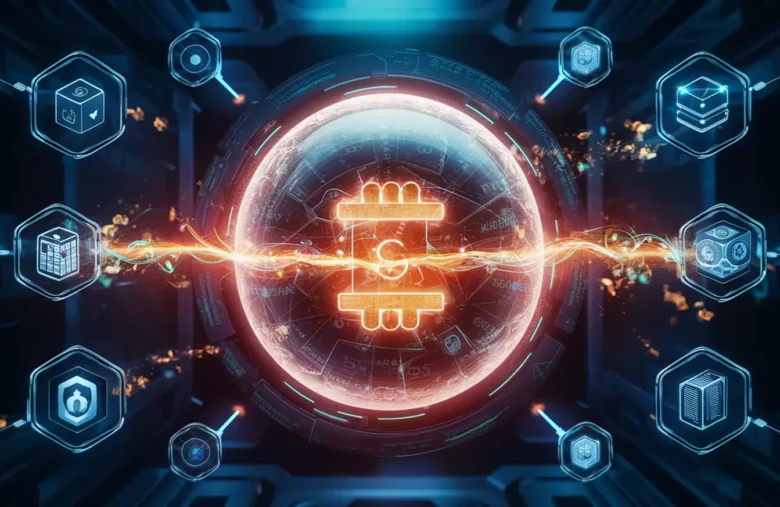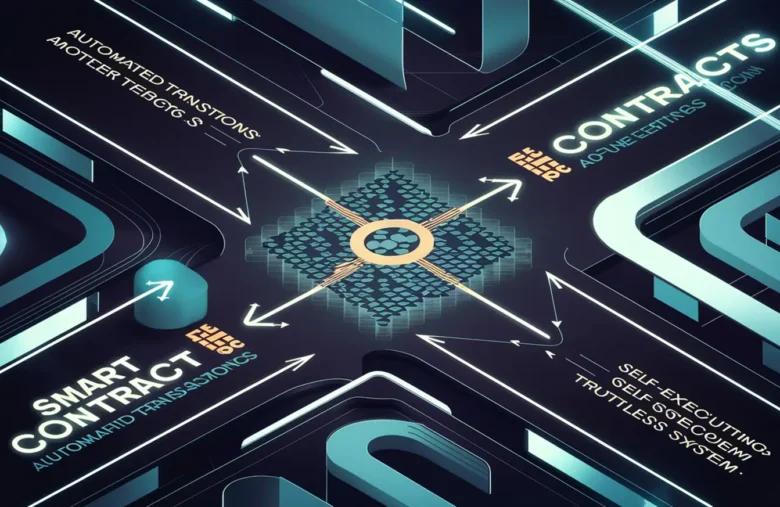If you have heard about the Ethereum blockchain, you have most likely heard about smart contracts. So, what is a smart contract?
A smart contract is a digital self-executing agreement or contract written in code. The contract is stored in the blockchain, and it is executed without the need for intermediaries.
Since smart contracts are powered by blockchain technology, they benefit from increased security and transparency. As such, they have found diverse applications in healthcare, education, voting, finance, etc.
In this article, we will explore the basics of smart contracts. We will evaluate smart contracts’ history and evolution to understand how they fit in the rapidly evolving technology space.
What is a Smart Contract?
Smart contracts are automated agreements between the creator and the recipient. Given that the contracts are created on the blockchain, they are immutable and irreversible, which makes them secure and trustworthy.
The goal of a smart contract is to automate the execution of an agreement without an intermediary. Instead, they rely on computer code to execute and enforce the terms of the contract.
For example, assume a smart contract between an artwork buyer and a seller. If the one buying a piece of art sends the amount that is agreed upon, the smart contract will transfer the ownership of the artwork from the seller to the buyer. The entire process is fast and cost-efficient.
History of Smart Contracts
Smart contracts were initially proposed by an American computer scientist known as Nick Szabo in 1994. Szabo later created a virtual currency known as Bit Gold in 1998, around ten years before Bitcoin was created.
Szabo described smart contracts as computerized transaction programs executing the terms of a contract. The computer scientist also proposed adopting smart contracts for assets such as derivatives and bonds to realize low transaction costs.
The smart contract world has since evolved. Ethereum, a blockchain created after Bitcoin, is now known as the “king of smart contracts.” The Ethereum blockchain is used to build decentralized applications (DApps).
How Do Smart Contracts Work?

Smart contracts are an automated agreement between two or three parties. This agreement is created and executed on the blockchain. The contract is executed if the needs of the parties are met.
While smart contracts are native to the cryptocurrency industry, their usage has evolved into the real world. Smart contracts can be amended to work in any space, whether in the supply chain, governmental mandates, finance, etc.
One of the best things about smart contracts is that they create trustless transactions. They eliminate the need to bring disagreements into court, ensuring that the involved parties save time and money.
The top feature of smart contracts is security. The rules and limitations embedded into these smart contracts guarantee that a malicious actor will not manipulate the rules. It also helps mitigate scams and any changes to the contract.
The Process of Building a Smart Contract
To understand how a smart contract works, we need to understand the process behind it. Below are the steps detailing the process of building a smart contract:
The terms of the contract
The first step is to detail the terms of the agreement. During this step, the obligations of every party involved and the standards for executing the contract are all noted down.
Setting the conditions for executing the contract
The second step is to set the conditions to be fulfilled for the contract to be executed. The conditions are jotted down as rules and guidelines that must be fulfilled for the contract to be valid.
Write the smart contract code
After setting the conditions that must be fulfilled, the other step is to write the smart contract code. This code outlines the steps necessary to execute the contract after the parties fulfill the set conditions.
Deploy the contract to a blockchain
The fourth step is to deploy the smart contract in a blockchain. In this process, the contract’s validity will be established by running the code on the blockchain.
Executing the smart contract
The smart contract is executed at this stage. The execution depends on whether the set conditions have been met. The blockchain on which the smart contract runs will activate the smart contract execution.
Record details on the blockchain
The particulars of the smart contract are then recorded into a blockchain network. The smart contract details are immutable in that they cannot be altered once entered into the blockchain.
Advantages of Smart Contracts
Many advantages exist from smart contract blockchains. These benefits are behind the rapid adoption of smart contracts across multiple industries.
For starters, smart contracts use computer protocols to automate actions. They streamline different commercial processes, which helps save time. Additionally, the lack of third parties in automating transactions has reduced the risk of human errors and manipulation in transaction processing.
Relying on a blockchain network and not a third party to execute the smart contract also helps to save costs. As such, smart contracts are more cost-efficient than the traditional way of processing transactions.
The smart contract’s conditions and details are recorded on a distributed blockchain ledger. This ensures that the transactions are transparent, which helps boost trust and accountability among the involved parties.
The immutable nature of smart contracts also ensures that the documents cannot be tampered with, further boosting trust. Moreover, there is no room for errors with smart contracts as one does not have to fill out forms manually.
Use Cases of Smart Contracts

The use case of smart contracts extends beyond crypto-native applications. The promise of transparency, accountability, cost-effectiveness, and immutability have led to the adoption of smart contracts across various industries. The current use cases of smart contracts include the following:
Finance
One of the primary use cases of smart contracts is in finance. Smart contracts are adopted for secure and automated financial transactions, allowing people to execute financial agreements without needing a third party. This use case has seen several leading financial institutions experiment with blockchain technology.
Decentralized Applications
The most popular use case for smart contracts is decentralized applications (DApps). Dapps include decentralized finance (DeFi) applications, non-fungible tokens (NFTs), and gaming platforms. DApps bring real-world functionality into the blockchain sector.
Supply Chain Management
The supply chain heavily depends on trust and transparency, which can be attained with smart contracts. With smart contracts, one can track and verify the movement of goods across the supply chain to boost openness, promote traceability, and minimize fraud. Some supply chain processes that can be automated with smart contracts include order fulfillment and payment settlement.
Voting
Smart contracts can also promote security and transparency in voting. It achieves this by guaranteeing the integrity of the votes while preventing fraud. The increased adoption of smart contracts in voting can promote transparency in the democratic process.
Healthcare
The healthcare industry is big on safeguarding patient data, and smart contracts can streamline patient data management. Adopting smart contracts in healthcare can also help resolve the issues of ransomware attacks in the healthcare system, as smart contracts are secure.
Challenges and limitations
Smart contracts have the potential to bring innovation across multiple industries. However, this innovation has its challenges. Smart contracts are developed using code created by humans, leaving them vulnerable to human error. Such errors can result in security breaches, the most popular being the 2016 Ethereum hack.
There is also the issue of regulatory uncertainty around smart contracts. The technology behind this innovation promises a decentralized, secure, and efficient way of transferring funds. However, one must consider issues such as taxation and government control to address crimes like money laundering and terrorism financing.
While the smart contract industry continues to witness growing adoption, this has also come with challenges. Scalability and network congestion are the main drawbacks of growing blockchain usage, a challenge seen with Ethereum.
The lack of scalability affects the performance and reliability of smart contracts during periods of high demand.
The Bottom Line
Smart contracts are automated agreements running on a blockchain. With smart contracts, one can create a digital agreement without relying on a third party, making them cost-effective, transparent, and more efficient.
Smart contracts are backed by blockchain technology, making them secure. The outstanding benefits of these contracts have seen them being widely adopted in areas such as supply chains, voting systems, decentralized applications, financial applications, and healthcare.
Despite the benefits, smart contracts also face significant challenges. For instance, they can suffer from scalability issues during periods of high network demand. The code is also written by humans, leaving room for error.
FAQs
-
What is a smart contract?
A smart contract is an automated digital agreement. The contract is written in code and stored on a blockchain. A smart contract is executed without the need for an intermediary.
-
What are smart contracts used for?
Smart contracts have many use cases, including voting systems, finance applications, decentralized applications, healthcare, and supply chain management.
-
Does Bitcoin have smart contracts?
Several upgrades on the Bitcoin blockchain, such as the Taproot upgrade and the Lightning Network, have improved its smart contract capabilities. However, Bitcoin’s smart contract capabilities are limited compared to programmable blockchains like Ethereum.
-
What are the disadvantages of smart contracts?
Smart contracts have several limitations such as scalability. The regulatory uncertainty around smart contracts also hinders their adoption.




